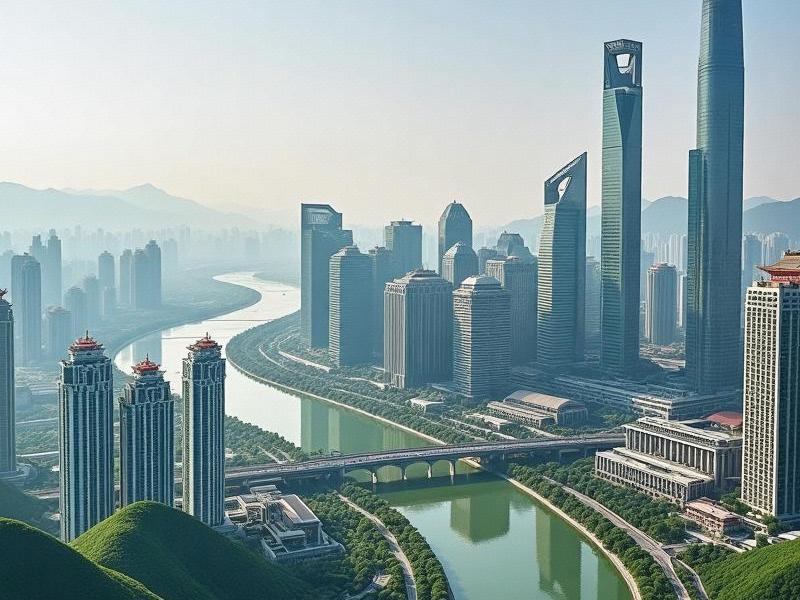
The Delta Paradox: Urban Colossus Meets Ecological Civilization
As the Yangtze River Delta region accounts for 4% of China's land but generates 25% of its GDP, Shanghai anchors an unprecedented experiment: creating a 350,000 km² sustainable megalopolis housing 160 million people. The "Green Delta Initiative" combines:
- 48 interconnected sponge cities
- 12 cross-provincial ecological corridors
- 7 cultural preservation economic zones
Chapter 1: Shanghai's Green Veins
The Huangpu River's metamorphosis into a living system:
- Bio-Smart Docks: 22 km of AI-monitored tidal wetlands replacing concrete embankments
- Floating Forests: 1.2 million aquatic plants deployed as natural water filters
- Carbon-Neutral Water Taxis: Hydrogen-powered ferries with rooftop moss gardens
The newly opened "Liquid Archive" museum uses VR to showcase river pollution levels from 1843 to present, while its algae walls purify 4,500 liters of air hourly.
Chapter 2: Chongming Island's Ecological Laboratory
Shanghai's 1,267 km² alluvial island becomes a testbed for:
上海龙凤论坛爱宝贝419 - Vertical Farms: 98-story agritech towers producing 40 tons of rice daily
- Tidal Energy Harvesting: Underwater kites generating power for 200,000 homes
- Migratory Bird Blockchains: Digital tracking of 340 endangered species
The "Eco-Island 2035" plan has already:
- Restored 400 km² of wetlands using AI-guided planting drones
- Established Asia's first carbon-negative resort community
- Converted abandoned factories into mycelium-based construction material labs
Chapter 3: Jiangnan Water Town Renaissance
Reinventing the Delta's ancient canal cities:
- Suzhou's Smart Canals: AI systems preserving 2,500-year-old water management wisdom
- Hangzhou's Cyber-Lotus Lakes: Floating solar farms shaped like traditional water lilies
- Ningbo's Carbon-sequestering Port: Seaweed cultivation absorbing ship emissions
上海龙凤419足疗按摩 In Wuzhen, the annual World Internet Conference now hosts:
- Digital twin models of ancient water towns
- AI algorithms predicting cultural heritage decay
- Blockchain systems protecting intangible crafts
The Rural Reboot
Innovative rural-urban partnerships:
- Shanghai chefs collaborating with Zhejiang farmers on "climate-smart" cuisine
- Urban architects revitalizing Anhui villages using rammed-earth 3D printing
- Jiangsu textile mills producing algae-dyed silk for Paris fashion houses
Technological Symphony
Cutting-edge sustainability tech:
- Shanghai's waste-to-energy plants power 10% of the grid
- Zhejiang's "Smart Grid" integrates 9 provincial power systems
爱上海同城对对碰交友论坛 - Jiangsu's AI weather stations predict pollution with 95% accuracy
Cultural DNA in Concrete Jungles
Preservation through innovation:
- Suzhou Museum's AR gardens explaining Ming dynasty rockery philosophy
- Hangzhou tea plantations using IoT to preserve Longjing traditions
- Ningbo's "Port Memory" project encoding maritime history into blockchain
The Delta Dialogues
Ongoing challenges in regional integration:
- Balancing economic growth with ecological carrying capacity
- Managing cross-provincial resource allocation
- Preserving local identities in standardization processes
As urban ecologist Dr. Liang Wei notes: "We're not just building smarter cities, but reprogramming the relationship between civilization and nature." From Shanghai's vertical forests to Anhui's carbon-sequestering villages, the Yangtze Delta writes a new chapter in humanity's urban saga – one byte, one seed, and one solar panel at a time.
